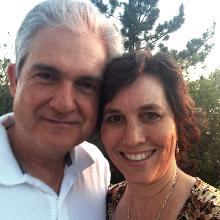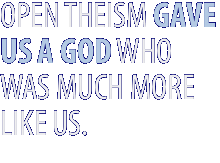HOME / PROCLAMATION! MAGAZINE / 2015 / WINTER / OPEN THEISM

MARTIN L. CAREY
Many of us were raised on Ellen White’s book The Great Controversy, a sweeping view of history that controlled our worldview. We lived with a pervasive sense of cosmic spiritual warfare that invaded all the corners of our lives. Before Adam and Eve, the book teaches, Satan rebelled and accused God of being cruel and arbitrary, putting God on the defensive. To appear fair, God allowed Satan to be an independent agent of evil so his principles would be fully manifested. God’s respect for free will was, therefore, a central piece of His government. The whole universe was watching to see who would finally be proven right, and all votes were to be counted. We understood that Satan was fully responsible for everything terrible that happened, and Satan’s power was evident everywhere. Satan had the power to hurt people, neutralize God’s plans, and trick us into going over to his side. Unfallen worlds were watching; we were in the cosmic limelight, and our choices were determining history!
We had been taught that the great controversy was still raging because God was forced to allow all sentient beings to choose His ways or Satan’s ways. God was on trial; His reputation was at stake, and He depended on us to vindicate Him by our obedience. God needed us to be His end time, showcase people. We had to help God defeat Satan or we could fail, thus delaying His plans and giving Satan even more power.
In 1980 Adventist professor Richard Rice’s book The Openness of God had quite an impact on Adventist university campuses. Although Rice’s views were not new,1 we learned of radical freewill, God’s limited foreknowledge, and an open future that God had not predetermined. Open theology was attractive to many of us longing for freedom from religious controls. If our free choices had no cause or pre-existing reality, then even God could not know them beforehand. If God couldn’t reliably know the future, then I could determine my own future, and anything was possible.
Over time, some of us realized that the exciting new theology had added to our sense of risk and uncertainty. The “open” God seemed closer, but less dependable than we needed Him to be in fundamental ways. Traditionally, Adventists were taught that God’s perfect foreknowledge of the future allowed end time prophecies to be certain. Under openness, however, the future was much less certain with God’s complete foreknowledge removed. Open theism gave us a God who was much more like us. He was locked inside time, didn’t know the future, frequently changed his mind, and could be thwarted by evil. All those billions of free creature choices constantly shifted the bigger picture and kept God re-calculating the odds. No one is safe in that cosmos. Open theist Gregory Boyd explains,
The cosmos is, by divine choice, more of a democracy than it is a monarchy. The warfare worldview thus presupposes the reality of relatively autonomous free creatures, human and angelic, who can and do act on their own, and who can and do sometimes go against God’s will. It thus presupposes the reality of radical contingency and of genuine risk. It further presupposes that this risk has sometimes gone bad, even on a cosmic scale, and that this has turned the earth into a veritable war zone.2
Greg Boyd is not an Adventist, but his warfare theology has much in common with that of Adventism’s open theists. While the evangelical church keeps redefining itself, open theism is gaining a firm foothold across denominations. Rick Rice and Greg Boyd have many colleagues who support their ideas, and the Adventist great controversy worldview which shapes Rick Rice’s theology has thus contributed to the growth of this notion. There is a battle in the church over God’s sovereignty and glory, and we cannot shrink from it. †
Endnotes
- See for example, Did God Know, by Howard Elseth and Gayle Teague. In the 16th century, Fausto Sozzini taught a similar doctrine known as Socinianism.
- Boyd, Gregory, God at War, Intervarsity Press, Downers Grove, Il., 1997, p. 58.

Copyright 2015 Life Assurance Ministries, Inc., Camp Verde, Arizona, USA. All rights reserved. Revised May 25, 2016. Contact email: proclamation@gmail.com


W I N T E R • 2 0 1 5
VOLUME 16, ISSUE 4
 Martin Carey grew up as a “nomadic” Adventist in many places. He works as a school psychologist in San Bernardino, California. Married to Sharon, he has two sons, Matthew, 14, and Nick, 27. Astronomy, research, and too many pets keep him in joyful disarray. You may contact him at martincarey@sbcglobal.net.
Martin Carey grew up as a “nomadic” Adventist in many places. He works as a school psychologist in San Bernardino, California. Married to Sharon, he has two sons, Matthew, 14, and Nick, 27. Astronomy, research, and too many pets keep him in joyful disarray. You may contact him at martincarey@sbcglobal.net.
